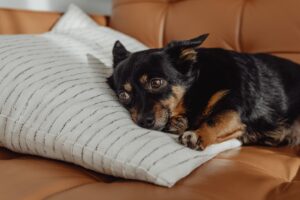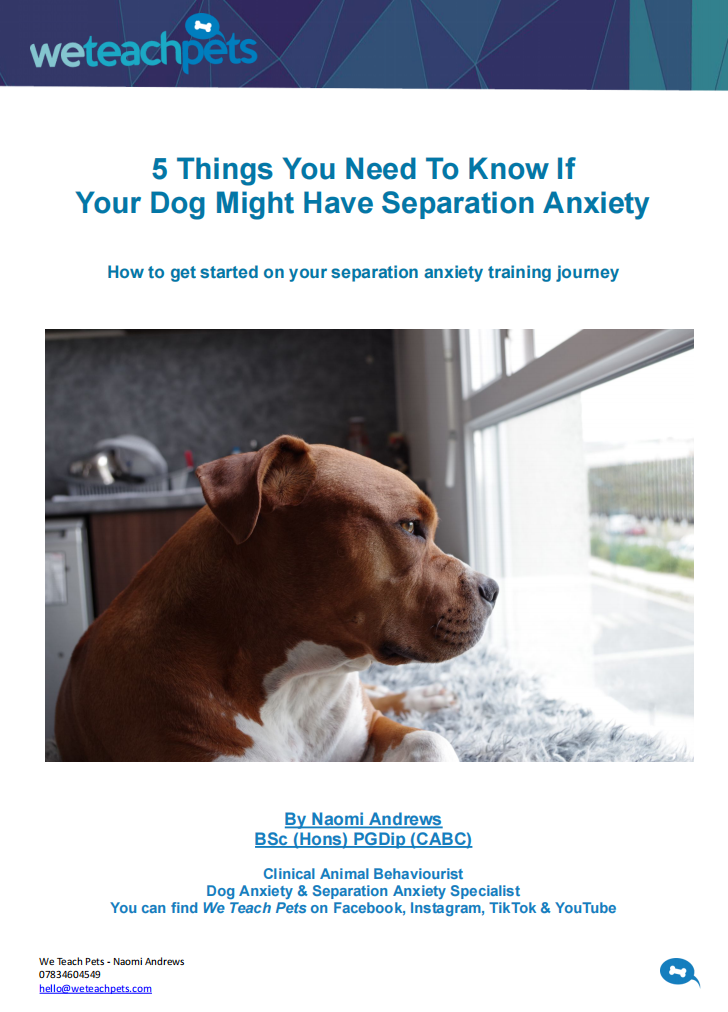Why separation anxiety might develop; there are lots of reasons!
The number one thing to remember is that you are probably not one of them! When thinking about why separation anxiety develops in dogs there are lots of myths out there. In fact if you start to read or ask people about anything dog behaviour related everyone has an opinion! This also applies to raising children, and just about anything!
We’re going to look at some risk factors for dogs developing separation anxiety below. Many of these factors increase risk of anxiety in general. Some dogs specifically display this when left alone. Often this is because their owners being present is what usually helps them to feel most comfortable.
Traumatic or frightening experiences
 The trauma doesn’t necessarily need to have happened when your dog was alone to develop separation issues. We can understand that some dogs develop issues with being left alone if they have been spooked by fireworks or thunderstorms. Or if they’ve experienced break ins when home alone. They then start to feel unsafe when alone in case these things happen again.
The trauma doesn’t necessarily need to have happened when your dog was alone to develop separation issues. We can understand that some dogs develop issues with being left alone if they have been spooked by fireworks or thunderstorms. Or if they’ve experienced break ins when home alone. They then start to feel unsafe when alone in case these things happen again.
However, having a fight with another dog on a walk, a painful accident or getting lost may also cause acute anxiety. This anxiety may be alleviated with the company and security of their human. But when you leave their stress levels rise again. The more your dog experiences this the more they associate being alone with fear. Over time the worse the separation anxiety becomes.
Loss of safety cues
Safety cues are certain things in the environment which help your dog to feel calm because they are familiar. They are associated with feelings of safety. For example being surrounded by their own things, being in a familiar place with familiar scents, being in a routine.
 Certain situations might trigger separation anxiety symptoms in dogs who have previously coped with separation. For example, if you’ve moved house or adopted your dog from another home. Elements of what has helped your dog to feel safe in the past are no longer there. For example you’ve thrown out their old stinky dog bed or got a new sofa and now some of the familiar smells which comforted your dog before have gone. Dogs are very scent driven and a change in the scent profile of the house can be a knock to their confidence. Dogs who can settle fine at home may struggle when in new places because of the lack of familiarity with relaxing in this situation.
Certain situations might trigger separation anxiety symptoms in dogs who have previously coped with separation. For example, if you’ve moved house or adopted your dog from another home. Elements of what has helped your dog to feel safe in the past are no longer there. For example you’ve thrown out their old stinky dog bed or got a new sofa and now some of the familiar smells which comforted your dog before have gone. Dogs are very scent driven and a change in the scent profile of the house can be a knock to their confidence. Dogs who can settle fine at home may struggle when in new places because of the lack of familiarity with relaxing in this situation.
Some dogs may have lost an attachment figure, and now cannot be left alone. Maybe your dog’s previous owner passed away, a favoured family member has left for university or a partner has moved out.
Or like my own dog Max (read more about his story here), maybe your dog is struggling with a change in routine. Many dogs thrive on predictability. A change in routine or your working hours may throw your dog and cause an emotional reaction.
Illness or discomfort – even in the past
 As dogs get older they may start to lose the accuracy of their senses. They may start to feel more vulnerable and need their humans nearby for security. Canine Arthritis Management states that 80% of dogs over 8 suffer with arthritis. Many dogs start to experience arthritis at a much younger age. Experiencing pain can increase anxiety, and vice versa. So if your dog is experiencing some discomfort, which could be their joints, muscles, or things like itchy or irritated skin or tummy ache, then they could also feel more anxious.
As dogs get older they may start to lose the accuracy of their senses. They may start to feel more vulnerable and need their humans nearby for security. Canine Arthritis Management states that 80% of dogs over 8 suffer with arthritis. Many dogs start to experience arthritis at a much younger age. Experiencing pain can increase anxiety, and vice versa. So if your dog is experiencing some discomfort, which could be their joints, muscles, or things like itchy or irritated skin or tummy ache, then they could also feel more anxious.
Work with a specialist on other areas of your dog’s health, alongside their separation anxiety training. This is important to address all contributing factors. Eliminating their health issues may not resolve their separation issues entirely as your dog may have made an association with being alone and feeling vulnerable. However without addressing underlying issues we’ll only make so much progress.
It could be that something that happened in the past is still causing some ongoing issues. For example some gastrointestinal illnesses may really disrupt the gut microbiome. An imbalance in the gut biome can have big impacts on behaviour. So this may set dogs up to experience higher levels of anxiety later on. Addressing their gut health as well as their anxiety is the best course of action.
What if none of this applies – then why separation anxiety?
Separation anxiety can develop for a variety of reasons. You might feel that it is your fault for spoiling your dog but this is not the case! Some dogs are genetically predisposed to developing separation anxiety. Despite owners doing all the right things, they just have that tendency. Another dog, in the same family and situation, may be totally fine being left alone.
Some dogs arrive in their new homes as puppies with a really high need to be with their owners. Whilst baby animals all tend towards wanting to be with their social group for safety, some take this to a higher level. Full blown separation anxiety can develop.
Your dog may be hyper attached to just you, or specific people. They cannot cope with you leaving them, but may be fine being left by/with others. Some dogs may not actually have true separation anxiety but show distressed behaviour because of something that happens when their owners are out of the house. For instance, they may actually be comfortable being alone, but if they hear a certain type of noise and their owner isn’t there to provide reassurance then they can no longer cope with it. This is where starting out with videoing your dog when they are alone is a great step. This helps us to know more about what we’re working with and training can be targeted accordingly.
Start your dog off on the right foot with their separation training
Search for “separation anxiety”, or “anxiety”, on the blog page for more information. And if you haven’t already, sign up for a download of 5 things you need to know to get started with your separation anxiety training below.
Or learn more about our 1-2-1 support programmes here.
Get in touch and tell me more about your dog and the myths you’ve encountered or are wondering about!
– Call on 07834604549
– Email on hello@weteachpets.com
Free Separation Anxiety Help Here!



